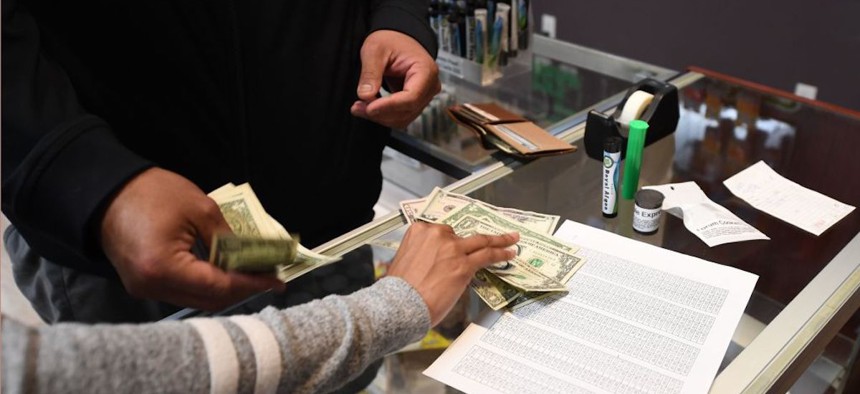Policy
Cannabis banking bill closer to a vote in the U.S. Senate
The bill would address a problem that has led to half of the nation’s cannabis dispensaries being robbed or burglarized.

Customers pay cash for their purchase at the Green Pearl Organics dispensary on the first day of legal recreational marijuana sales on Jan. 1, 2018 in Desert Hot Springs, California. ROBYN BECK/AFP via Getty Images
A bill that states and cities have long said would cut robberies of cannabis businesses by letting them open bank accounts is moving towards a vote in the U.S. Senate, where marijuana advocates expect it to be passed.
A Senate committee on Wednesday voted to advance the SAFER Banking Act, which would finally address the fact that most banks in the country do not service cannabis companies as marijuana remains illegal at the federal level despite several states legalizing its medicinal and recreational use.
In addition, Democratic Senate Majority Leader Chuck Schumer has said a future bill will seek to provide funding for cites and states to expunge minor marijuana possession convictions from people’s records, a move that supporters say will help deal with the disproportionate number of minorities arrested during the War on Drugs.
However, advocates of the bill, including David Culver, senior vice president of the U.S. Cannabis Council, say they’re worried that a government shutdown could delay the Senate from voting on the measure.
“For anybody that's trying to move a piece of legislation through Congress by the end of this year, the government shutdown is not a good thing,” he said.
The bill would tackle a problem that, according to a resolution passed by the U.S. Conference of Mayors last year, has led to half of the nation’s cannabis dispensaries being robbed or burglarized.
Marijuana businesses have to handle large amounts of cash because banks do not want to risk prosecution for violating laws barring "aiding and abetting" federal crimes.
The act would deal with this concern by prohibiting federal banking regulators, including the Treasury Department and the Federal Reserve, from taking “adverse action” against banks that provide financial services to state-sanctioned cannabis businesses. Banks would also not be punished for working with businesses that sell supplies or provide services to cannabis companies.
In Florida, Chief Financial Officer Jimmy Patronis has long sought for the federal government to allow banks to do business with state-authorized medical marijuana companies, a multibillion-dollar industry throughout the nation.
In a letter to then-President Donald Trump, for instance, Patronis – a Republican –outlined the dangers facing dispensaries mainly operating as “cash-only businesses,” as banks and credit unions won’t take their deposits due to “the lack of federal clarity on cannabis banking.”
“This leads to medical marijuana dispensaries handling this problem in an antiquated and dangerous manner by transporting millions of dollars in duffle bags of cash and even driving the cash endlessly around in trucks,” he wrote in 2019.
Forty-seven states and the District of Columbia have legalized the use of marijuana in some form, including as medicinal or recreational—23 states and the district allow the latter.
In a letter to Senate leaders on Monday urging passage of the bill, the National Conference of State Legislatures said that forcing cannabis businesses to operate only with cash increases “the real risk that these cannabis businesses become prime targets for theft, burglary, armed robbery and other property crimes that jeopardize the safety of the business owners and the communities in which they operate.”
“Regardless of how you feel about states’ efforts to legalize marijuana, this bipartisan bill will make it safer for illegal cannabis businesses and service providers to operate, to protect their workers first and foremost, and to operate in their communities,” said Ohio Sen. Sherrod Brown, the Democratic chairman of the Senate Committee on Banking, Housing and Urban Affairs.
“Cannabis workers also faced challenges proving their income when trying to rent a home or apply for a mortgage,” he added.
Montana Sen. Steve Daines, a Republican who opposes the legalization of marijuana, said he supported the measure because “the SAFER Banking Act is not about that. It's not about that at all. It is not a step in that direction. This bill is about public safety.”
The bill’s lone opponent, Sen. Raphael Warnock, a Georgia Democrat, expressed concerns the measure would mainly help white-owned businesses and “just make the comfortable more comfortable.”
“This bill will make life safer for bankers, for businesses and financial institutions, some of whom have been profiting from the cannabis industry illegally for years,” he said, “which is ironic given many of the regular folks who illegally sold or used cannabis are sitting in jail cells right now.”
But Sen. Jeff Merkley, an Oregon Democrat, who has sponsored previous versions of the bill that have not been able to pass the Senate, noted that the bill would require the Government Accountability Office to study whether the measure disproportionately helped white-owned businesses.
Schumer said he intends to add $20 million in funding to a future bill to encourage more states and cities to remove low-level drug possession convictions from people’s records.
The funding could help push more states and cities to address the disproportionate arrests of Blacks, said the National Organization for the Reform of Marijuana Laws. According to a report by the group last December, 24 states have passed laws to expunge low-level cannabis convictions from people’s criminal records.
“If somebody has a conviction expunged from their record, it means that it will not show up in background checks, which is really important in terms of things like education, housing, employment, jobs, child custody or professional licensure,” said Morgan Fox, the group’s political director.
While changing the banking laws has gotten bipartisan support to pass the House seven times, Culver said he is hopeful, but uncertain how quickly Republican Speaker Kevin McCarthy would bring up the measure for a vote.
In a move that could win conservative support for the bill, Schumer said he is “committed” to also adding a measure proposed by Florida Republican Rep. Brian Mast. The requirement would remove a federal ban on marijuana users from owning guns.
In a press release, Mast said, “No one should be forced to choose between their rights: you have a right to bear arms, and in many states, you have a right to use cannabis.”
Merkley said he would support the provision: “If you are a cannabis user, it cannot be a basis for denying your Second Amendment rights,” he said.
The News Service of Florida contributed background. Kery Murakami is a senior reporter covering Congress and federal policy for Route Fifty, where this story was first published. He can be reached at kmurakami@govexec.com. Follow @Kery_Murakami on X.
NEXT STORY: Florida Atlantic University interim president gets backing to be offered job
